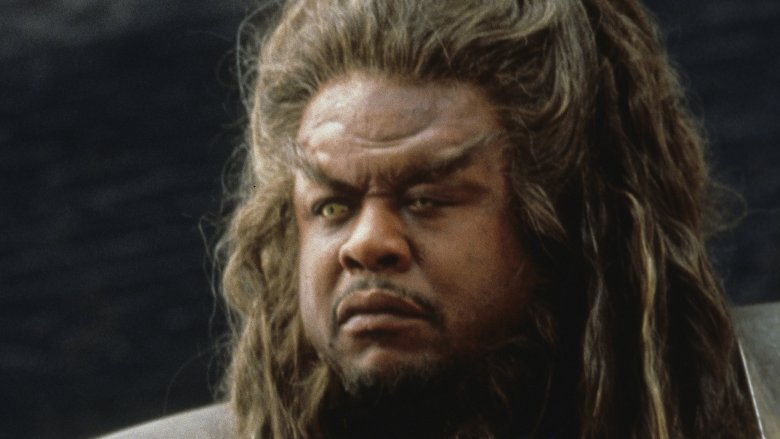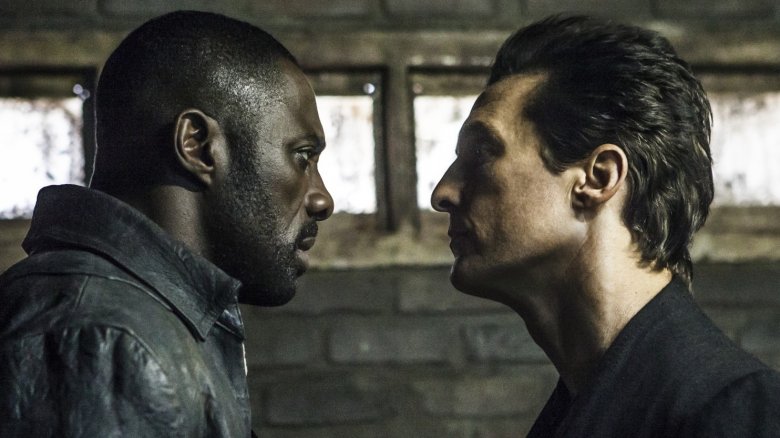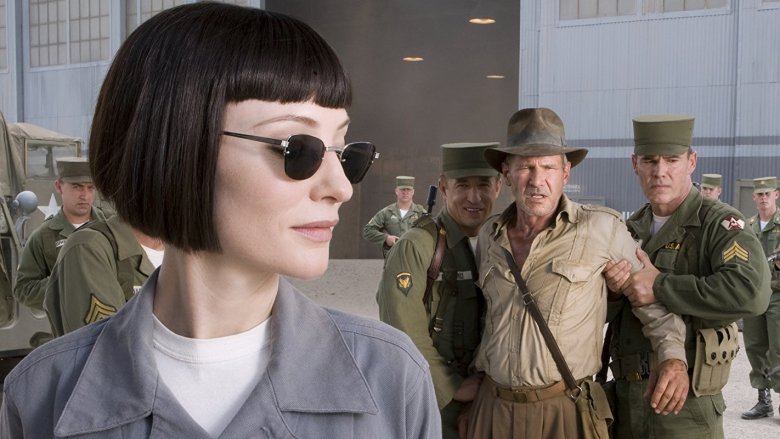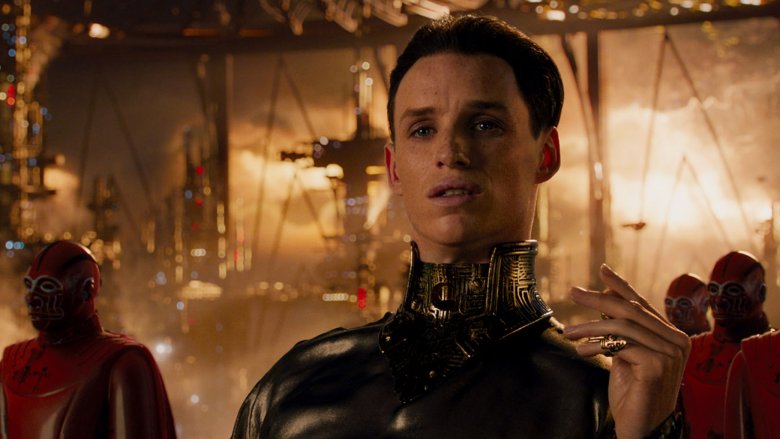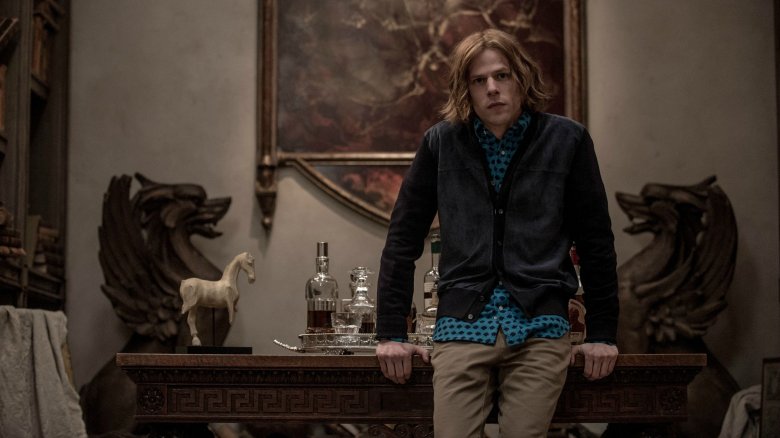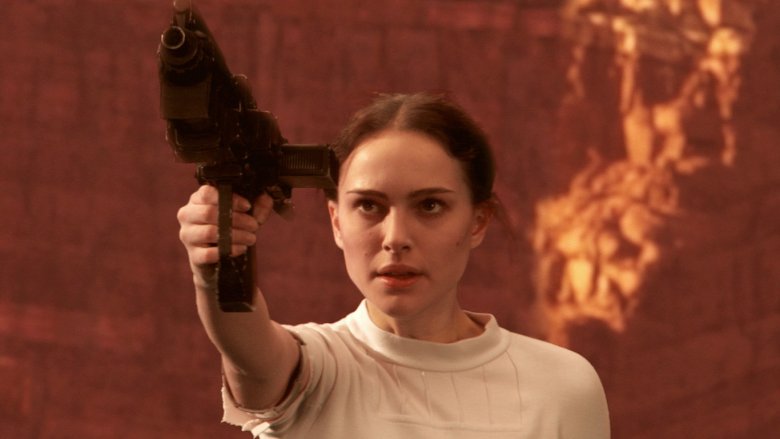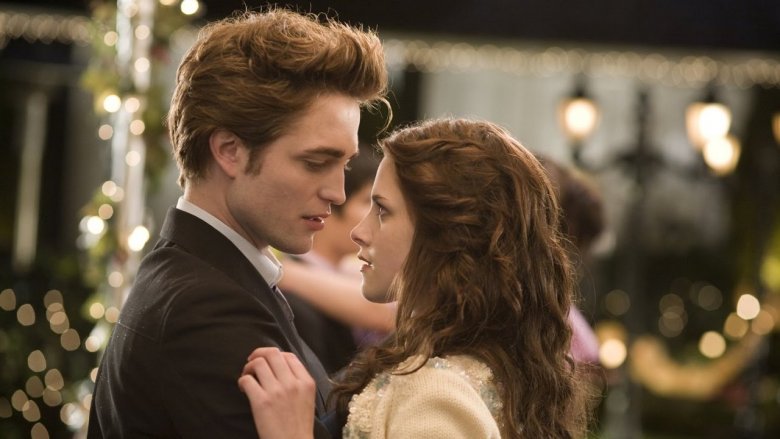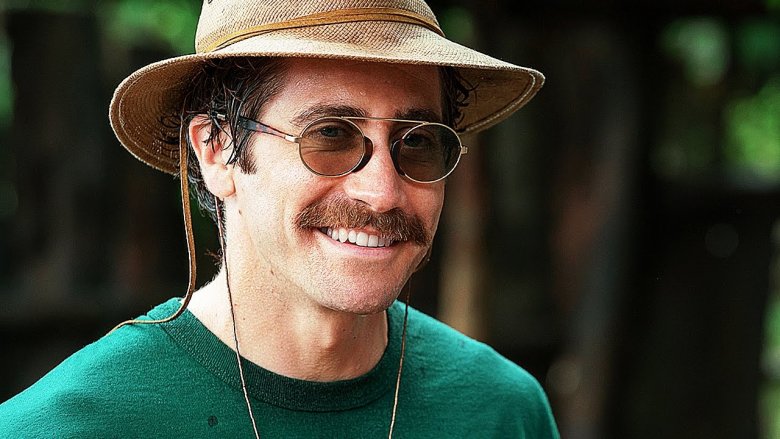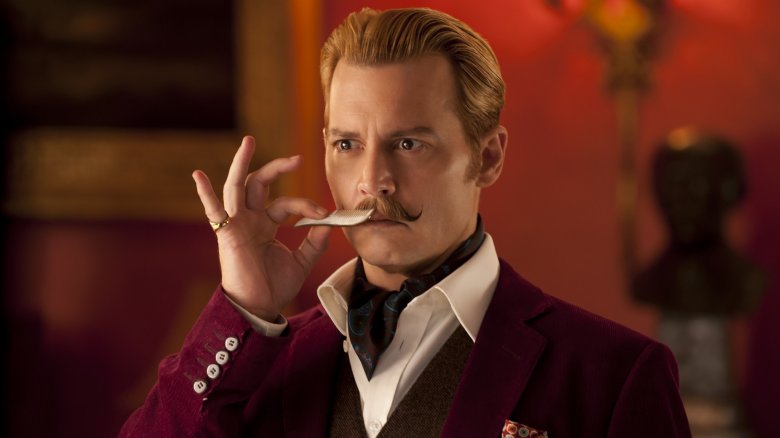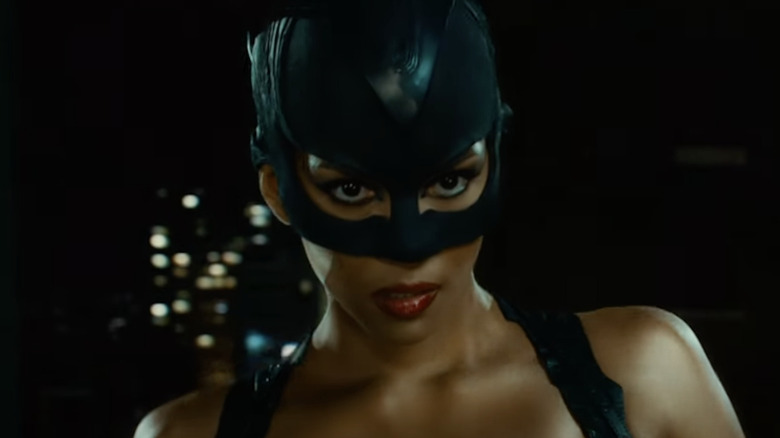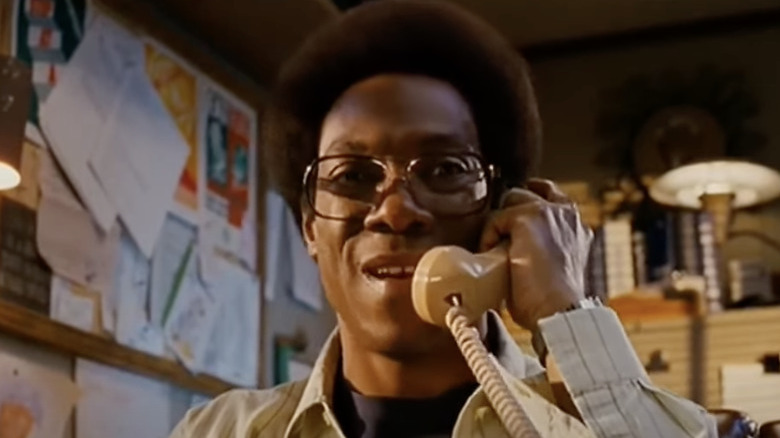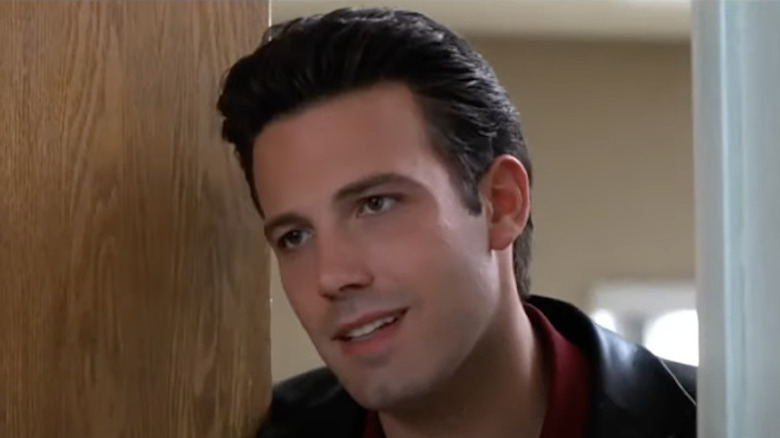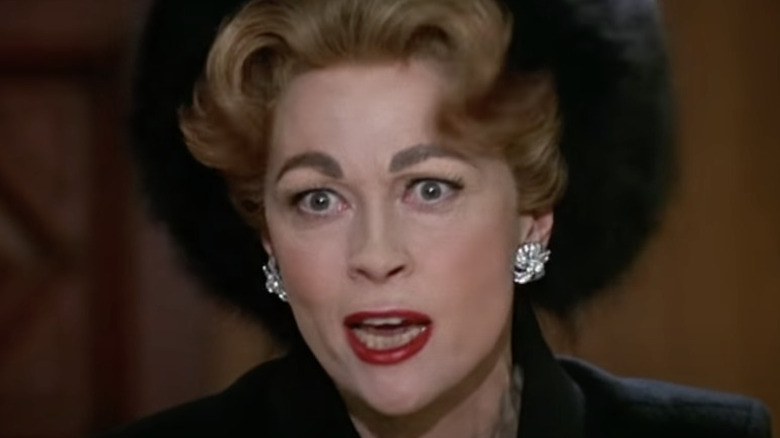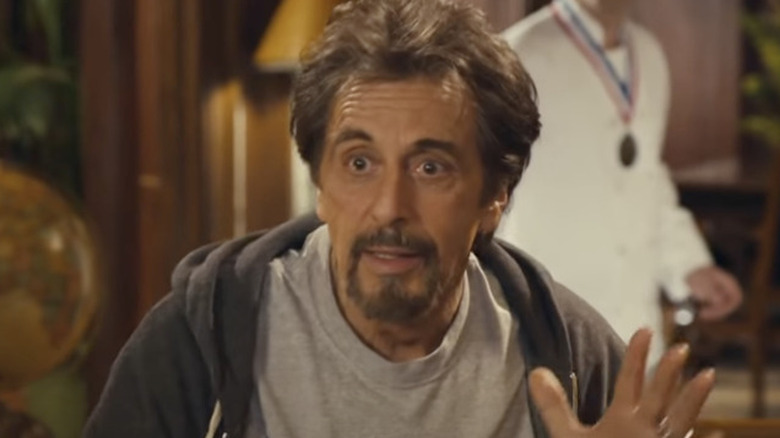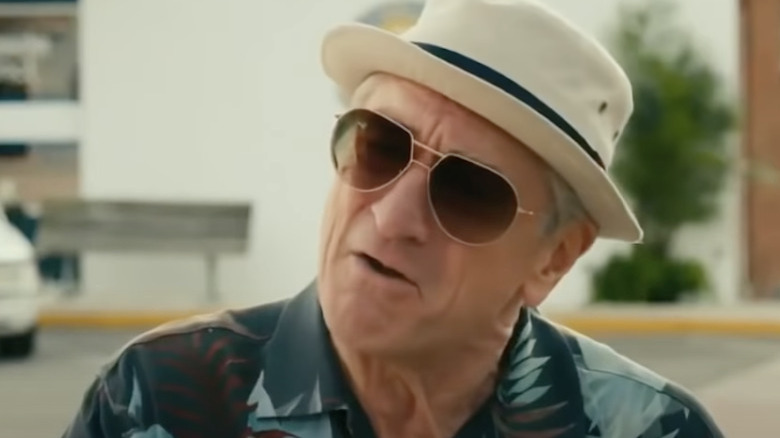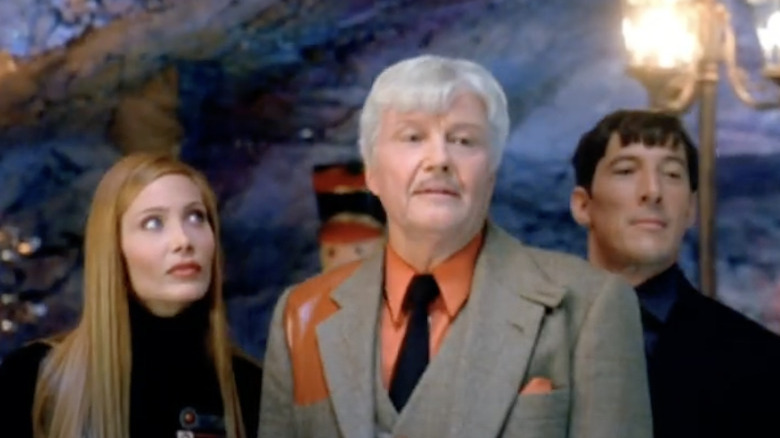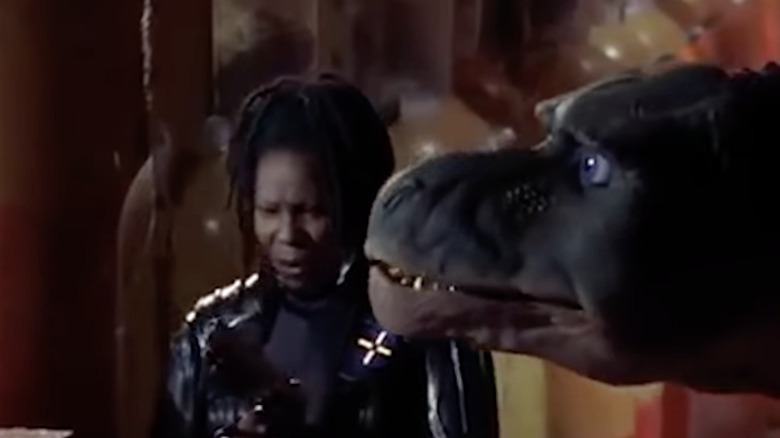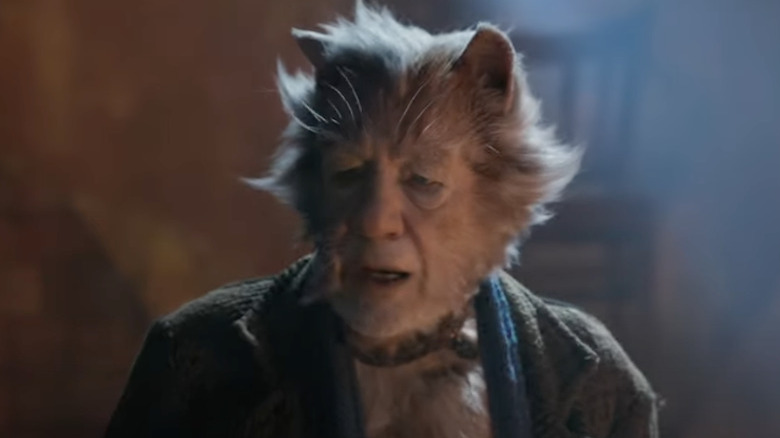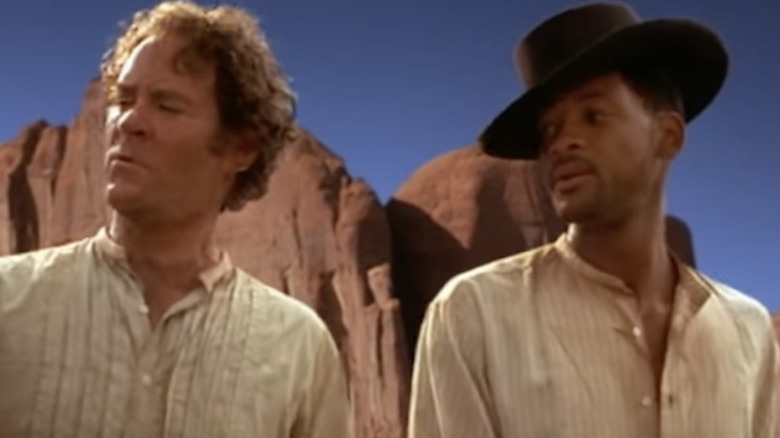Awful Performances By Hollywood's Best Actors
No one is perfect, and even the most talented among us are forced to face their own fallibility from time to time — including Hollywood's biggest and brightest stars. No matter how many Oscars they might have in their display case, every single actor on the planet will give a bad performance sooner or later. It's just the law of averages. Perhaps a critically beloved actress ends up choosing a truly lousy screenplay; maybe a respected star suffers through a particularly bad day on the set. Whatever the reason, even the best actors have offered up some truly awful performances that will live forever in Hollywood infamy. We still love these stars, of course, but we're not above offering a reminder of those misguided misfires by taking a look at some of the all-time worst. With that in mind, here's a not-so-fond tribute to some awful performances by Hollywood's best actors.
Forest Whitaker: Battlefield Earth (2000)
For such an awful movie, "Battlefield Earth" features some pretty amazing actors. Barry Pepper was incredible in movies like "True Grit," "25th Hour," and "Saving Private Ryan." John Travolta was fantastic in "Saturday Night Fever," "Pulp Fiction," and "The People vs. O.J. Simpson." But if we had to pick the best actor to appear in this piece of sci-fi garbage, it's hard to argue with Forest Whitaker.
The man won an Oscar for his powerful performance as the insane dictator Idi Amin in "The Last King of Scotland." He was the essence of cool in "Ghost Dog: Way of the Samurai," he tore at our heart strings in "The Crying Game," and he grabbed everybody's attention with his leading role in "Bird." What's such a talented guy doing in one of the worst-reviewed films of all time? A movie based on a novel written by the man who created Scientology, no less?
The answer is simple: he was delivering the worst performance of his career. Playing Ker, an oversized alien with dreams of getting rich, Whitaker is forced to drop insults like "corporate crap heads" and earnestly wonder why humans enjoy eating rats. If this were a comedy, maybe it would work, but it's supposed to be deadly serious. So when Whitaker delivers his lines in caveman fashion, it comes off as unintentionally hilarious. His only saving grace is that he's partially shielded by Travolta's insane performance as the power-hungry Terl.
Of course, even if Whitaker was doing an amazing job, it hardly would've mattered, as he's buried under some of pretty terrible makeup. David Edelstein of Slate said Whitaker was "coiffed to resemble the Cowardly Lion in 'The Wiz,'" and Roger Ebert added in his review that Whitaker's costume looked like it was "purchased from the Goodwill store on the planet Tatooine."
Marlon Brando: The Island of Doctor Moreau (1996)
Make a list of the greatest all-time actors, and you've got to include Marlon Brando, who revolutionized Hollywood by introducing method acting to the mainstream. He's dropped some of the most famous movie lines in cinematic history — "The horror, the horror," "I'm gonna' make him an offer he can't refuse," "Stella!" — and won Oscars for "On the Waterfront" and "The Godfather." But near the end of his career, Brando could be guilty of phoning it in, and nowhere is that more evident than "The Island of Doctor Moreau."
Anyone familiar with the behind-the-scenes story of "Apocalypse Now" knows that Brando was incredibly difficult to work with. Worse still, when he showed up for "Doctor Moreau," he was still reeling from the loss of his daughter, Cheyenne. Brando also admitted to being bored on set, and this all combined to create the perfect storm. He covered his face in pancake makeup. Then he started wearing an ice bucket on his head for no reason. He also decided his character needed to have a dwarf constantly by his side, a move that would later inspire Mini-Me of the "Austin Powers" films. None of it made any sense for the character of Doctor Moreau, but nobody could stop Brando.
Worse still, the script was constantly being rewritten, and Brando was having trouble keeping up. According to Sabotage Times, the situation was remedied by giving the actor an earpiece and having someone feed him his lines. Check out the excellent Val Kilmer documentary "Val" for his first-hand footage of the chaotic set — and disappointment that rather than acting opposite his hero, Kilmer would be working opposite a double. The antennae, meanwhile, allegedly kept on receiving signals from nearby police radios, and Brando had a hard time distinguishing his actual lines from police chatter—resulting in a mess of a performance that signaled the Brando of old was gone for good.
Matthew McConaughey: The Dark Tower (2017)
After years of embarrassing himself with movies like "Failure to Launch" and "How to Lose a Guy in 10 Days," Matthew McConaughey finally broke free from his rom-com curse by appearing in solid films like "The Lincoln Lawyer," "Bernie," and "Mud." He sleazed it up in "Magic Mike," got a blockbuster gig with "Interstellar," and won a Best Actor Oscar for his turn as AIDS patient Ron Woodroof in "Dallas Buyers Club."
So McConaughey seemed like the perfect guy to play the Man in Black, a.k.a. Walter, the villain of Stephen King's beloved fantasy series "The Dark Tower." Really, at this point, King fans were eager to see anyone in the role; they'd been waiting years to watch the Man in Black flee across the desert, with the Gunslinger following. Unfortunately, the 2017 adaptation forgot the face of its father and bombed with critics, flopped at the box office, and earned McConaughey some pretty dark reviews.
Scott Wampler of Birth.Movies.Death. described McConaughey's performance as "showboaty and embarrassing," while Sam Adams of Slate said that "McConaughey's matter-of-fact evil...reads more like the indifference of a check-cashing movie star." Michael O'Sullivan of The Washington Post slammed the actor by saying his performance was "unlikely to evoke deathly shivers so much as a terminal case of the giggles," but Alison Willmore of Buzzfeed had the best burn of all when she wrote McConaughey "offers up what's basically a more evil version of whatever he's doing in those Lincoln car commercials."
Cate Blanchett: Indiana Jones and the Kingdom of the Crystal Skull (2008)
Cate Blanchett is one of the greatest actresses to grace a movie screen. She's basically a chameleon, a woman who completely disappears into her roles, morphing into figures like Bob Dylan, Queen Elizabeth, and Katharine Hepburn — a performance that won her a Best Supporting Actress Oscar. She won the big one for "Blue Jasmine," wowed critics with "Carol," and hammed it up to everyone's delight in "Thor: Ragnarok."
But hey, nobody's perfect — something she learned with "Indiana Jones and the Kingdom of the Crystal Skull." Playing the semi-psychic Soviet Irina Spalko, Blanchett just comes off as silly and forgettable in a role that Peter Travers of Rolling Stone described as "a one-note villain ... with an accent that conjures up Rocky and Bullwinkle more than the desired red menace."
Granted, this is an Indiana Jones movie, so nobody's looking for realism. But Indy's bad guys need to generate some sort of emotion from moviegoers other than "meh." Belloq evoked contempt, Toht evoked fear, and Mola Ram evoked so much disgust that Steven Spielberg had to create an entirely new rating. Irina Spalko, on the other hand, evokes little more than a shoulder shrug. If any other actress had played the part, nobody would care as much, but this is Cate Blanchett, and she's capable of so much more.
Eddie Redmayne: Jupiter Ascending (2015)
The year 2015 was a pretty epic one for bad performances. There was Josh Gad and Kevin James in "Pixels," Chevy Chase in "Hot Tub Time Machine 2," and Jason Lee in "Alvin in the Chipmunks: The Road Chip." But as terrible as these actors were, they couldn't steal the shameful spotlight from Eddie Redmayne, who defeated all four actors to win the Worst Supporting Actor Razzie for his performance as Balem Abrasax in "Jupiter Ascending."
Ironically, this Wachowski flick hit theaters just a few days before Redmayne won his Best Actor Oscar for playing Stephen Hawking in "The Theory of Everything," beating Michael Keaton, Steve Carell, and Benedict Cumberbatch. But while his performance as the disabled physicist was flawless, the same can't be said for his turn as a whispery space titan.
Wearing Elton John's discarded outfits, Redmayne wildly modulates between throaty murmurs and wide-eyed, sweaty-faced shouting. In fact, Redmayne's screaming was so epically bad that after criticizing the actor for being "so slight, so boyish, that he never comes across as intimidating at all," Stephanie Merry of The Washington Post wrote, "Redmayne raises his voice to epic soprano levels when reaming out his otherworldly lackeys. If he's capable of inflicting damage, it's to eardrums alone." In other words, in an over-the-top movie filled with dog-eared super soldiers and bat-winged dinosaurs, Redmayne sticks out as the most outrageous thing in the film.
Jesse Eisenberg: Batman v Superman: Dawn of Justice (2016)
Jesse Eisenberg wowed everyone when he played Mark Zuckerberg in "The Social Network," and while we can argue all day about the accuracy of David Fincher's film, there's no denying Eisenberg gave a powerhouse of a performance. He was even nominated for a Best Actor Oscar.
In addition to playing the social media mogul, Eisenberg has left his mark on movies like "The Double," "Roger Dodger," "The End of the Tour," and "The Squid and the Whale." But every great actor has their cinematic kryptonite, and in Eisenberg's case, that's "Batman v Superman: Dawn of Justice." The curly-haired star won a Worst Supporting Actor Razzie for his performance as Lex Luthor, a role that was probably better suited for someone older and more menacing. Honestly, Eisenberg is the worst Luthor of all time, especially when compared to the likes of Gene Hackman and Michael Rosenbaum.
Eisenberg was just too loud and manic to play the Man of Steel's archenemy, and honestly, he would've done a far better job as the Riddler or the Joker. Putting a new spin on a classic character was a risky move on Eisenberg's part, and sadly, it just didn't pay off.
Natalie Portman: The Star Wars prequel trilogy (1999—2005)
When Natalie Portman is on top of her acting game, she's an absolute phenom. That's why she won the Best Actress Oscar for "Black Swan," a role where Portman killed it as a frightened ballerina descending into madness. She earned an Academy Award nomination for her turn as a stripper in Mike Nichols' "Closer," and she gained her third Oscar nod for a soul-shattering performance as the first lady in "Jackie." Go back to her early days, and Portman was stealing the show in films like "Leon: The Professional" and "Beautiful Girls."
Of course, not every performance deserves a little gold statue — witness the horrors of the "Star Wars" prequel trilogy. As it turns out, when you're working with George Lucas, you'll either end up in the most iconic movies ever made, or you'll have your career dragged through the mud over the course of three films. Unfortunately for Portman—not to mention Ewan McGregor, Samuel L. Jackson, and Liam Neeson—the latter proved true when she was cast as Queen Amidala, a.k.a. Padme.
Maybe it was the stale script with all that corny dialogue. Maybe it was working with a director who prefers special effects to actors. Or perhaps it was the fact she had zero chemistry with her leading man. Whatever the reason, Portman was one of the worst parts of the prequel trilogy, which is really saying something. Need proof? Then check out that Razzie-worthy moment from "Attack of the Clones" when she's rolling through a field with Hayden Christensen, or watch the cringe-worthy scene when Padme tearfully confronts Anakin in "Revenge of the Sith." Every stilted line and fake emotion is painful and heartbreaking.
Kristen Stewart: The Twilight Saga (2008—2012)
At this point, it's safe to say that anyone still making fun of Kristen Stewart clearly hasn't watched any of her movies since 2008. Once the butt of endless jokes, Stewart has won critical acclaim for films like "Into the Wild" and "Camp X-Ray," impressed audiences in "Personal Shopper," and walked away with pretty much every award in the film festival world for her work in "Clouds of Sils Maria." In 2022, she earned her first Oscar nomination as Princess Diana in "Spencer."
But despite her performances in "Adventureland," "Still Alice," and "American Ultra" (which some feel is an underrated movie), Stewart might never completely shake the shadow of the "Twilight" films. Spend a few minutes on YouTube, and you'll find countless videos skewering her performance as Bella Swan. And in fairness, she is pretty rotten in this undead franchise, coming off as flat, monotone, and decidedly non-human. In fact, Stewart was nominated for Razzies on two separate occasions before "winning" in 2012 for the double whammy of "Breaking Dawn—Part 2" and "Snow White and the Huntsman."
Honestly, though, it's difficult for any actor — even the best in the business — to do good work with a horrible script, especially if that screenplay is based on subpar source material. And after the vampire franchise was finally staked in the heart, Stewart went on to prove that she was far more talented than she appeared in the Stephenie Meyer series (the same can be said for Robert Pattinson, most prominently earning praise for his take on Batman). Still, as far as vampire films go, Stewart's performance in "Twilight" is bloody awful.
Jake Gyllenhaal: Okja (2017)
It's fair to say Jake Gyllenhaal is one of the best actors in Hollywood today. The man has played a mild-mannered cartoonist, a brooding detective, an emaciated sociopath, and a love-struck cowboy. He's starred in "Stronger," "Enemy," "Donnie Darko," and "End of Watch," each and every time giving a solid performance. And that's what makes "Okja" so utterly baffling.
Directed by Bong Joon-ho, this Korean sci-fi flick follows a little girl trying to rescue an oversized swine from the clutches of a meat-crazed corporation. Along the way, she encounters a host of zany characters, from evil twins to an animal rights activist who refuses to eat. But without a doubt, the most annoying character she runs across is Dr. Johnny Wilcox (Gyllenhaal), an American zoologist and TV show host who tortures pigs, makes questionable fashion choices, and couldn't whisper if you paid him.
Gyllenhaal's over-the-top theatrics drew the ire of critics, prompting Dana Stevens of Slate to write, "There are broad performances, there are performances said to be 'as broad as a barn,' and then there's Gyllenhaal's performance." Kyle Buchanan of Vulture said his turn as Dr. Johnny was "so flamboyant, you can see it from space." Andrew Lapin of NPR claimed Gyllenhaal "squeals more than the pigs do," and Matt Zoller Seitz described the actor as a "flat-out casting disaster."
Even fans of Gyllenhaal's performance had to throw out some disclaimers, with David Sims of The Atlantic warning Dr. Johnny "will undoubtedly not work for everyone." As for the actor himself, Gyllenhaal responded to the criticism by saying he loved the reactions and that his performance was meant to be polarizing. Still, there's a big difference between an unlikable character and an irritating acting job, and here, Gyllenhaal falls in the latter category.
Johnny Depp: Mortdecai (2015)
Let's be honest. It's been a long, long time since anyone called Johnny Depp a great actor. Sure, he won some praise for his performance as Whitey Bulger in "Black Mass," but for the most part, he's been wearing silly disguises, using ridiculous accents, and slumming it in movies like "Yoga Hosers," "Dark Shadows," and "Alice Through the Looking Glass." And of course, his very public court battles haven't helped.
And that's a real shame because once upon a time, Depp was a living, breathing masterclass in playing weirdos and screwballs. The guy who played in "Tusk" is the same actor who wowed critics and audiences alike with performances in "Ed Wood," "Edward Scissorhands," and the original "Pirates of the Caribbean." He even occasionally toned things down for solid performances in more realistic films like "Donnie Brasco" and "What's Eating Gilbert Grape?"
So really, "Mortdecai" perfectly sums up what's become of Depp's once-impressive career. The worst-reviewed movie in a checkered filmography, it finds him playing a mustachioed art thief on the hunt for a painting that might lead to Nazi treasure. And in unfortunate Depp fashion, it's a performance based solely on physical tics, funny voices, and absolutely no substance.
As film critic Peter Sobczynski put it, Depp's performance was "on the level of a below-average knock-knock joke." The folks who run the Razzies agree, as he was nominated for Worst Actor (losing out to Jamie Dornan for "Fifty Shades of Grey"). And domestic audiences weren't impressed either, as "Mortdecai" grossed just $7.6 million at home against a $60 million budget. That's a pretty long way to fall after starring in the 21st highest-grossing movie of all time.
Halle Berry: Catwoman (2004)
After more than a decade as one of Hollywood's most likable stars of mainstream comedies ("Boomerang"), serviceable dramas ("Losing Isaiah"), and action spectaculars ("X-Men"), Halle Berry delivered an absolutely devastating gut-punch of a performance in the sad, engrossing 2001 indie movie "Monster's Ball." Her work as Leticia Musgrove, the grieving widow of an executed convict falling in love with her husband's executioner, won Berry an Academy Award for Best Actress. But the kind of showy, meaty scripts befitting a newly-minted Oscar winner didn't follow for Berry. After "Monster's Ball," Berry was a "Bond girl" in "Die Another Day," played Storm in another X-Men" movie, co-starred in the horror flick "Gothika," and in 2004, played the titular character in the Batman spinoff "Catwoman."
The film consists mainly of Berry strutting around Gotham City in a tight, flesh-baring catsuit (on which the camera languidly lingers), smirking to herself as she commits crimes and avoids capture. "Catwoman is essentially an excuse to pose Berry in ever-skimpier outfits," Keith Phipps of The AV Club wrote. Berry at least tried to save this bomb of a movie, according to Andrea Thompson of The Spool, who credited the actor with "the amount of effort she spent trying to salvage the unsalvageable, putting her all into every idiotic line." Berry herself called "Catwoman" a "piece of s***, god-awful movie" when she accepted her Razzie Award for Worst Actress in person.
Eddie Murphy: Norbit (2007)
In the first half of the 1980s, Eddie Murphy was the hottest star on TV, dominating "Saturday Night Live" with hilarious characters like Velvet Jones, Buckwheat, and Mr. Robinson. Then he became a major movie star, headlining classic comedies of the '80s and '90s including "Beverly Hills Cop," "Trading Places," "Coming to America," and "The Nutty Professor." After some box-office bombs such as "The Adventures of Pluto Nash" and "I Spy," Eddie Murphy was back on top of Hollywood in 2006, earning plaudits for his rare dramatic turn as a tragic '60s R&B singer in the 2006 movie adaptation of the musical "Dreamgirls." Murphy received his first ever Academy Award nomination, and he was predicted by Oscars pundits and experts to triumphantly take home a statuette. But then "Norbit" came along, apparently derailing everything.
Oscar voting was in full swing in early 2007 when "Norbit" was opening in theaters, blanketing Los Angeles in billboards and other advertisements that depicted Murphy as an obese woman in a neglige, pinning down a meek man also played by Murphy. At a time when Murphy's team was trying to convince voters he was an Oscar-worthy actor, the "Norbit" campaign felt like an anti "For Your Consideration" ad.
Murphy starred in "Norbit" as the titular character, a nerdy doormat who falls into an abusive relationship (played for laughs) with a mean woman named Rasputia Latimore. With the aid of prosthetics and a cringe-inducing fake accent, Murphy also portrayed Chinese orphanage caretaker Mr. Wong, and, with makeup, wigs, and a fat suit, played Raputia, too. Critics hated the fart joke-heavy "Norbit," a film with a 9 percent rating on Rotten Tomatoes. It's also entirely possible that Academy Award voters, seeing "Norbit" everywhere, thought twice about checking the box for Murphy. Alan Arkin ultimately won Best Supporting Actor for "Little Miss Sunshine" over Murphy.
Ben Affleck: Gigli (2003)
In 2003, it had become something of a national pastime to rag on "Gigli." Part romantic comedy, part mob movie, potentially insulting to the LGBTQ community, Italians, disabled people and who knows how many other groups, "Gigli" was indeed a very bad movie, even without considering how the release was overshadowed by the tabloid-dominating romance of "Bennifer."
Jennifer Lopez portrayed Ricki, a charming gangster sent to help out an inept, low-level mob goon tasked with kidnapping the mentally disabled brother (played by neurotypical actor Justin Bartha) of a federal prosecutor going after their syndicate. Ricki is gay, but she somehow can't resist the charms of Affleck's Gigli — a sputtering, clownish, Italian-American stereotype, one part "Jersey Shore" cast member and one part an imitation of Joe Pesci from "Goodfellas."
The Independent Critic found Affleck, so terrific in "Argo," "Gone Girl," "Gone Baby Gone," "The Way Back," and "Good Will Hunting," to have "no chemistry with Lopez," which was odd since she was his fiancée at the time. "Ben Affleck, an Oscar-winning screenwriter, is a man of many talents," wrote Joel Siegel of ABC News. "I'm not sure acting is among them."
Faye Dunaway: Mommie Dearest (1981)
Most A-list actors work very hard on their craft, preparing and executing efficiently to ensure a quality performance that does justice to the script and their character. But it can be a slippery slope — try too hard at a role, particularly one that's already larger than life, and their work can quickly become campy.
Perhaps the perfect example of this is Faye Dunaway, who made a series of bad decisions with the salacious biopic-meets-exposé "Mommie Dearest." In a film based on the parent-attacking memoir by Christina Crawford (the daughter of Hollywood legend Joan Crawford), Dunaway, an icon of boundary-pushing, definitive '70s American films like "Network," "Bonnie and Clyde," and "Chinatown," went completely over the top.
There is so subtly whatsoever in the performance, all shrieks and shouted monologues. Clearly, she was trying to show just how much of a cruel monster Christina Crawford claimed her mother to be, but she lays it on so thick that it's laughable. "Mommie Dearest" has become a cult classic, but in the worst way — snorted at by generations of filmgoers as an inadvertent comedy. Viewers will find it hard to not want to imitate every histrionic line Dunaway-as-Crawford screams at her children, particularly her most famous: "No! Wire! Hangers! Ever!"
Al Pacino: Jack and Jill (2011)
In a career filled with silly, high-concept comedies loathed by critics, Adam Sandler's "Jack and Jill" has the impressive distinction of being the most poorly-reviewed theatrical film he has ever made, earning a woeful 3 percent on Rotten Tomatoes; it was also the first movie to ever sweep the Razzie Awards, winning 10 prizes for ineptitude in film.
Sandler plays the titular twins, both of them utterly unlikeable, a workaholic commercial producer and his obnoxious, loud, emotionally fragile sister. But while Sandler's broad style doesn't feel out of place in the wacky, physical comedy-oriented flick, Al Pacino sure does.
Pacino works on a completely different level in the Adam Sandler comedy – and yes, that sentence felt as strange to write as it did to read. Known for the intense skills he put to good use in cinematic touchstones like "Dog Day Afternoon," "Serpico" and the "Godfather" films, those same skill simply pain Pacino as unhinged in "Jack and Jill." But what's strange is that Pacino's worst performance has him misplaying ... himself. The sole motivation of his "character" — to romance Jill, who is Adam Sandler in women's clothes and a wig — leaves him with nothing to work with other than a perverse fascination with an utterly unappealing woman.
Pacino aggressively makes unwanted advances towards Jill, groping her, touching her, trying to show her how to play Brooklyn-style stickball when he isn't going off on long, meandering, mumbled tangents about his life, work, and wealth with a wide and wild-eyed stare that uncomfortably penetrates other characters and the audience, too. But hey, it wasn't all a waste; at least the film gave us the DailyDunkaccino Twitter account.
Robert De Niro: Dirty Grandpa (2016)
After building up a legendary career as one of the most respected actors of his generation, Robert De Niro — star of searing masterpieces like "Taxi Driver," "The Godfather: Part II," "The Deer Hunter," and "Raging Bull" — has spent most of the new millennium playing grumpy old men.
This strategy may have worked out commercially with "Meet the Parents" and its sequels, but not so much with "The Big Wedding," "Everybody's Fine," "The War with Grandpa," or "Dirty Grandpa," a critical dud with a tired premise. De Niro, so frequently the orchestrator of singular roles with singular talent and detail, has been reduced to portraying the cliched lusty old man who wants to party hard and make Viagra jokes, tricking his buttoned-up grandson into taking him to Daytona Beach for spring break festivities. He is, in other words, exactly what the title says he is: a dirty grandpa.
Flavorwire's Jason Bailey called the movie "the absolute nadir of late-period Robert De Niro, which is really saying something," while critic Richard Crouse said its "the kind of film that, one day, De Niro's great-grandchildren will watch and wonder what all the fuss about him was."
Jon Voight: Superbabies: Baby Geniuses 2 (2004)
Jon Voight's career has spanned seven decades, beginning in the 1960s and exploding with an Oscar-nominated breakout role as a naive sex worker in the 1969 Best Picture winner "Midnight Cowboy." A decade later, he gave voice to the experience of hundreds of thousands of American men as a Vietnam War veteran readjusting to civilian life in "Coming Home," for which he won the Oscar for Best Actor. In 2001, Voight was nominated again for playing Howard Cossell in the Muhammad Ali biopic "Ali," and in recent years, Voight has turned to TV, earning accolades and awards for his roles on "24" and "Ray Donovan."
But Voight doesn't only appear in prestigious projects. He's a prolific actor who has sometimes felt like another Michael Caine, unapologetically taking paychecks wherever they present themselves. Certainly the rock bottom of his resume of 100 projects is "Superbabies: Baby Geniuses 2."
For those who haven't seen the OG classic "Baby Geniuses," the films are about evil scientists experimenting on babies, who then talk and fight evil. In this sequel, Voight plays the villainous Bill Biscane, a German tycoon with a Hitler mustache and bad blond wig, locked in an endless battle with a James Bond-type baby. "Superbabies" scored a perfect 0 percent on Rotten Tomatoes, with many critics blaming the film's awfulness squarely on Voight.
The Austin Chronicle called his performance that of a "superhammy nincompoop" while the San Francisco Chronicle's critic "felt embarrassed" for the actor and USA Today said that Voight "looked more comfortable being regurgitated" in the snake-based horror movie "Anaconda."
Whoopi Goldberg: Theodore Rex (1995)
"Theodore Rex" is a movie so strange, misbegotten, and largely forgotten that it feels like a fake movie you'd see in a real one making fun of the entertainment industry. But no, Whoopi Goldberg really did star in a gritty police movie about a human and a dinosaur, paired up as detectives trying to solve a crime in a world where people and talking dinosaurs co-exist.
Because the movie featured dinosaurs that looked like the ones on ABC's Jim Henson Television co-production "Dinosaurs," "Theodore Rex" was marketed as a family movie, even though it's not child-friendly. It also never made it to theaters; after spending a not-insubstantial $35 million, New Line Cinema dumped "Theodore Rex" direct to video in 1995 following miserable test screenings.
Whoopi Goldberg played the human half of the detective duo in "Theodore Rex." Her performance as a futuristic police officer, acting opposite a pretend dinosaur, does not rank with her iconic, crowd-pleasing work in "The Color Purple," "Ghost," "Sister Act," or "Star Trek: The Next Generation." Goldberg seems alternately bored, annoyed, anxious, and wooden, and with good reason. After trying to back out of a promise to star in the movie, producers sued Goldberg in 1993, and after much legal wrangling, the actor was essentially forced by the courts to act in "Theodore Rex." Looking at her performance all these years later, it sure seems like she was determined to put in as little effort as humanly possible.
Ian McKellan: Cats (2019)
"Cats" is an extremely theatrical experience, which is probably why it took so long to make it into a movie. Debuting on Broadway in 1982 (and running for nearly 20 years), it's an almost entirely sung show about stray cats jumping around, singing baffling and inscrutable lyrics, which Andrew Lloyd Webber based on a book of barely connected children's poems written as a lark by T.S. Eliot.
The 2019 film's sprawling cast included nearly 80 actors, including such formidable talents as Dame Judi Dench, Sir Ian McKellen, Idris Elba, and Jennifer Hudson. Collectively, those four actors have won two Oscars on 11 nominations and 11 BAFTAs on 34 nods. And what did director Tom Hooper do with these, and other perfectly decent actors, including Rebel Wilson, Taylor Swift, and Ray Winstone? He dressed them up in shabby cat costumes and had them prance around a soundstage while singing nonsensical songs about cat life, while CGI technology shrank them down to cat size. The whole idea should have been relegated to the litter box.
"Cats" features such hard-to-watch scenes as McKellen, best known as the mighty Gandalf in the iconic "The Lord of the Rings" films, lamenting his glory days as a young theater cat, and Judi Dench as a feline with the improbable name of Old Deuteronomy. "Cats" was nominated for nine Razzie Awards, with Dench singled out for her particularly im-purr-fect performance.
The male cast of Wild Wild West (1999)
By 1999, Hollywood's obsession with adapting old TV shows into hugely budgeted movies was nearing its end, and the final nail in the coffin may have been this big screen adaptation of the quirky, largely forgotten 1965-69 sci-fi Western "The Wild Wild West."
The $170 million summer tentpole starred the usually bankable movie Will Smith and reliably compelling Kevin Kline as James West and Artemus Gordon, respectively, two post-Civil War era federal agents tasked with rescuing President Grant from bitter ex-Confederate scientist Dr. Arliss Loveless (Kenneth Branagh) who employs a number of steampunk doomsday machines, including a gigantic robotic spider. Branagh, the renowned British actor and filmmaker regarded as the modern era's most influential and passionate interpreter of the plays of William Shakespeare, portrayed Dr. Loveless with none of the grace, nuance, and depth he brought to his work in "Henry V" or "Hamlet," acting instead like a sputtering, over-the-top madman with a preposterous Southern accent that's more Foghorn Leghorn than Robert E. Lee. Branagh is an Academy Award winner, as are Kline and Smith, for "A Fish Called Wanda" and "King Richard." But all that gold didn't help them here.
Both actors struggle to be their usual charming, entertaining selves in "Wild Wild West," a preposterous mess of a movie that tries to be a comedy, Western, sci-fi epic, dramatic period piece, romance, and action flick all at once. Smith and Kline took home the Razzie Award for Worst Screen Couple, while the film itself won Worst Screenplay and Worst Picture of the year.
